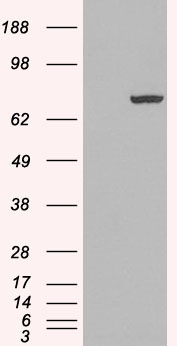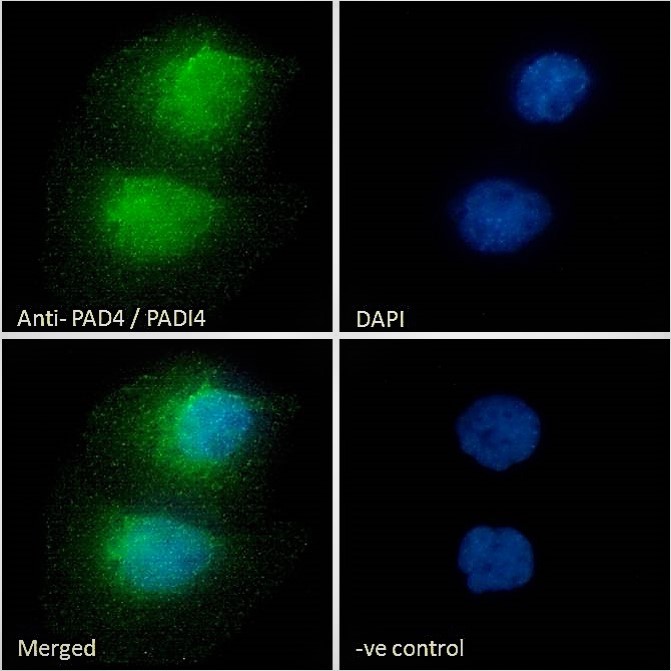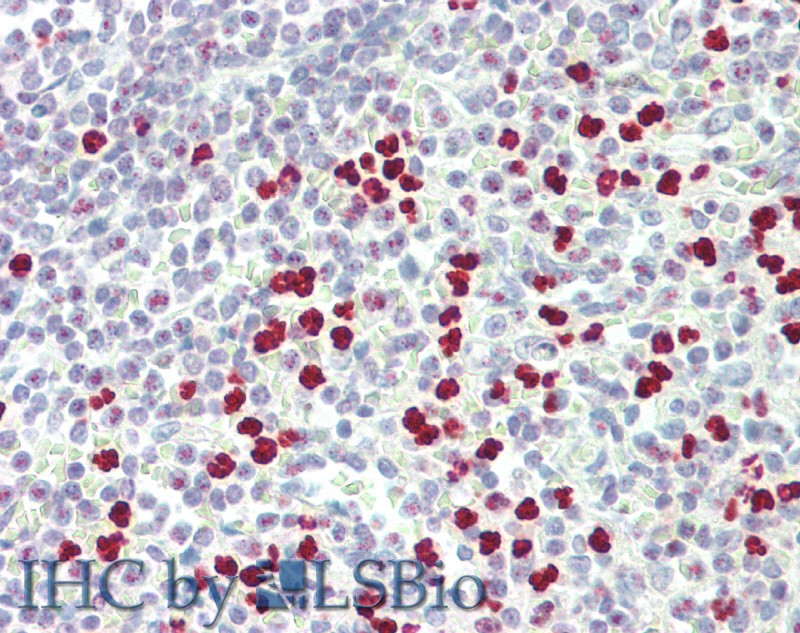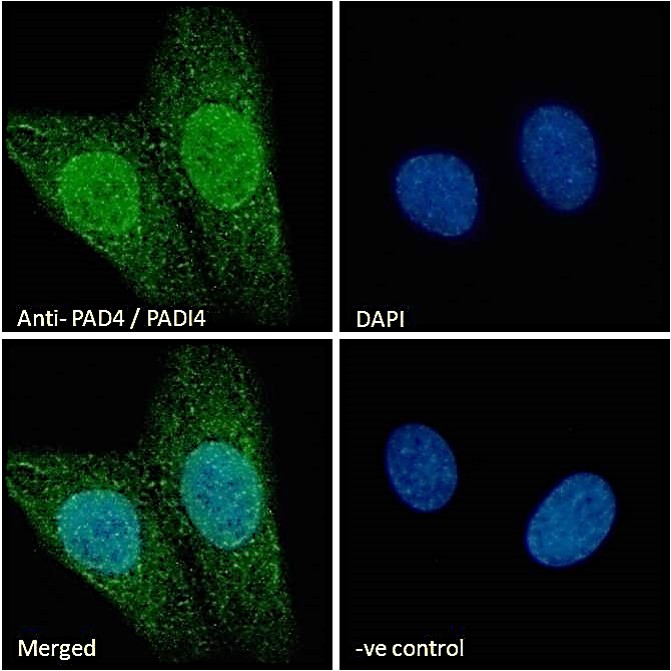Goat Anti-PAD4 / PADI4 Antibody
Peptide-affinity purified goat antibody
- SPECIFICATION
- CITATIONS
- PROTOCOLS
- BACKGROUND

Application
| IF, Pep-ELISA |
|---|---|
| Primary Accession | Q9UM07 |
| Other Accession | NP_036519, 23569 |
| Reactivity | Human |
| Host | Goat |
| Clonality | Polyclonal |
| Concentration | 100ug/200ul |
| Isotype | IgG |
| Calculated MW | 74079 Da |
| Gene ID | 23569 |
|---|---|
| Other Names | Protein-arginine deiminase type-4, 3.5.3.15, HL-60 PAD, Peptidylarginine deiminase IV, Protein-arginine deiminase type IV, PADI4, PADI5, PDI5 |
| Dilution | IF~~1:50~200 Pep-ELISA~~N/A |
| Format | 0.5 mg IgG/ml in Tris saline (20mM Tris pH7.3, 150mM NaCl), 0.02% sodium azide, with 0.5% bovine serum albumin |
| Storage | Maintain refrigerated at 2-8°C for up to 6 months. For long term storage store at -20°C in small aliquots to prevent freeze-thaw cycles. |
| Precautions | Goat Anti-PAD4 / PADI4 Antibody is for research use only and not for use in diagnostic or therapeutic procedures. |
| Name | PADI4 |
|---|---|
| Synonyms | PAD4, PADI5, PDI5 |
| Function | Catalyzes the citrullination/deimination of arginine residues of proteins such as histones, thereby playing a key role in histone code and regulation of stem cell maintenance (PubMed:15339660, PubMed:15345777, PubMed:16567635, PubMed:21245532). Citrullinates histone H1 at 'Arg-54' (to form H1R54ci), histone H3 at 'Arg-2', 'Arg- 8', 'Arg-17' and/or 'Arg-26' (to form H3R2ci, H3R8ci, H3R17ci, H3R26ci, respectively) and histone H4 at 'Arg-3' (to form H4R3ci) (PubMed:15339660, PubMed:15345777, PubMed:16567635, PubMed:21245532). Acts as a key regulator of stem cell maintenance by mediating citrullination of histone H1: citrullination of 'Arg-54' of histone H1 (H1R54ci) results in H1 displacement from chromatin and global chromatin decondensation, thereby promoting pluripotency and stem cell maintenance (PubMed:15339660, PubMed:15345777, PubMed:16567635, PubMed:21245532). Promotes profound chromatin decondensation during the innate immune response to infection in neutrophils by mediating formation of H1R54ci (PubMed:18209087). Required for the formation of neutrophil extracellular traps (NETs); NETs are mainly composed of DNA fibers and are released by neutrophils to bind pathogens during inflammation (By similarity). Citrullination of histone H3 prevents their methylation by CARM1 and HRMT1L2/PRMT1 and represses transcription (PubMed:15345777). Citrullinates EP300/P300 at 'Arg- 2142', which favors its interaction with NCOA2/GRIP1 (PubMed:15731352). |
| Cellular Location | Cytoplasm. Nucleus. Cytoplasmic granule. Note=Cytoplasmic granules of eosinophils and neutrophils. |
| Tissue Location | Expressed in eosinophils and neutrophils, not expressed in peripheral monocytes or lymphocytes |

Thousands of laboratories across the world have published research that depended on the performance of antibodies from Abcepta to advance their research. Check out links to articles that cite our products in major peer-reviewed journals, organized by research category.
info@abcepta.com, and receive a free "I Love Antibodies" mug.
Provided below are standard protocols that you may find useful for product applications.
Background
This gene is a member of a gene family which encodes enzymes responsible for the conversion of arginine residues to citrulline residues. This gene may play a role in granulocyte and macrophage development leading to inflammation and immune response.
References
The PADI4 gene does not contribute to genetic susceptibility to rheumatoid arthritis in Chinese Han population. Chen R, et al. Rheumatol Int, 2010 Jun 20. PMID 20563870.
Peptidyl arginine deiminase type IV (PADI4) haplotypes interact with shared epitope regardless of anti-cyclic citrullinated peptide antibody or erosive joint status in rheumatoid arthritis: a case control study. Bang SY, et al. Arthritis Res Ther, 2010. PMID 20537173.
Contribution of anti-CCP antibodies, proximal interphalangeal joint involvement, HLA-DRB1 shared epitope, and PADI4 as risk factors for the development of rheumatoid arthritis in palindromic rheumatism. Tamai M, et al. Scand J Rheumatol, 2010 Aug. PMID 20476860.
Cumulative association of 22 genetic variants with seropositive rheumatoid arthritis risk. Karlson EW, et al. Ann Rheum Dis, 2010 Jun. PMID 20233754.
Coordination of PAD4 and HDAC2 in the regulation of p53-target gene expression. Li P, et al. Oncogene, 2010 May 27. PMID 20190809.
If you have used an Abcepta product and would like to share how it has performed, please click on the "Submit Review" button and provide the requested information. Our staff will examine and post your review and contact you if needed.
If you have any additional inquiries please email technical services at tech@abcepta.com.













 Foundational characteristics of cancer include proliferation, angiogenesis, migration, evasion of apoptosis, and cellular immortality. Find key markers for these cellular processes and antibodies to detect them.
Foundational characteristics of cancer include proliferation, angiogenesis, migration, evasion of apoptosis, and cellular immortality. Find key markers for these cellular processes and antibodies to detect them. The SUMOplot™ Analysis Program predicts and scores sumoylation sites in your protein. SUMOylation is a post-translational modification involved in various cellular processes, such as nuclear-cytosolic transport, transcriptional regulation, apoptosis, protein stability, response to stress, and progression through the cell cycle.
The SUMOplot™ Analysis Program predicts and scores sumoylation sites in your protein. SUMOylation is a post-translational modification involved in various cellular processes, such as nuclear-cytosolic transport, transcriptional regulation, apoptosis, protein stability, response to stress, and progression through the cell cycle. The Autophagy Receptor Motif Plotter predicts and scores autophagy receptor binding sites in your protein. Identifying proteins connected to this pathway is critical to understanding the role of autophagy in physiological as well as pathological processes such as development, differentiation, neurodegenerative diseases, stress, infection, and cancer.
The Autophagy Receptor Motif Plotter predicts and scores autophagy receptor binding sites in your protein. Identifying proteins connected to this pathway is critical to understanding the role of autophagy in physiological as well as pathological processes such as development, differentiation, neurodegenerative diseases, stress, infection, and cancer.






